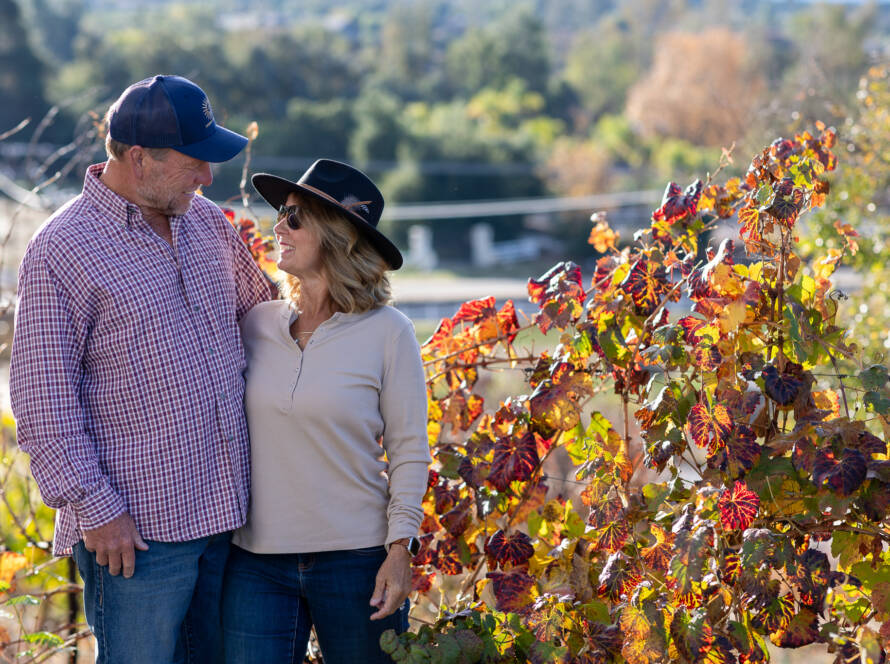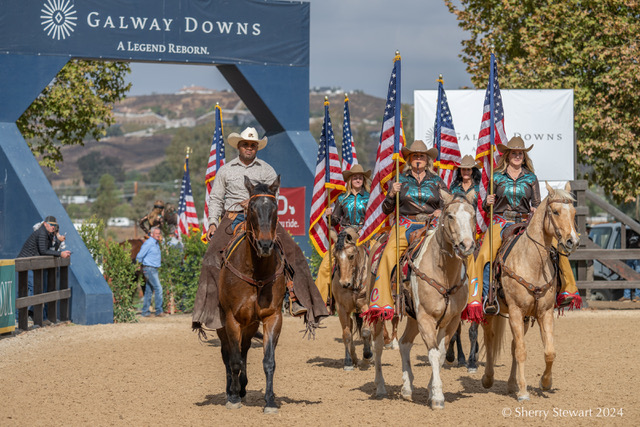Photo courtesy of Sherry Stewart
Amid excitement around Olympic equestrian competition coming to Temecula in 2028, equestrian lifestyle advocates must set their sights far beyond that. That was the battle cry of an Equine Sub-Committee gathering of the Temecula Valley Host Committee, on November 1 at Galway Downs Equestrian in Temecula.
After a three-year courtship, the Galway Downs team partnered with the LA28 Organizing Committee on a potential plan to host equestrian and para-equestrian competition in the Temecula Valley.
The Los Angeles City Council must still provide a final approval. But now is the time to get organized as a unified equine community if the Olympics are to be more than “a plaque on the property somewhere that says, ‘The Olympics were held here.’ An equine legacy is important,” said Mike Millay.
“It’s not about getting a bigger piece of the pie. It’s about growing the pie.”
Millay has been working with Galway Downs’ owners Ken and Tina Smith, equestrian director Robert Kellerhouse and others to lead the LA28 bid process.
The head of Clancy Sports, he is a pioneer and veteran in the sports tourism and event industry. Millay advises communities and venue operators on how to attract high profile events and create economic impact that benefits multiple stakeholders long after the visiting athletes go home.
Corralling A Siloed Community
“We want Southern California to become a stronger equestrian community through a more unified voice,” said Millay of the impetus for forming this subcommittee that is intended to provide community support to Galway Downs efforts with LA28.
The region’s equestrian community is not as strong as it once was and is very fragmented now, Millay stated.
That was old news to meeting attendees who included equine association leaders, ranch owners, and members of the media and Temecula City Council. Equestrian lifestyle advocates relayed long-standing frustrations over attempts to corral a famously fragmented community.
Everyone agreed the Olympics could be the stimulus to overcome those challenges. The question was how.
A proposed economic impact study reflecting the region’s wide swath of equine activities and effect is critical and it’s in the works, Millay relayed. It will estimate the effects of new or existing equine activity on the economy. Areas of focus will include what owners spend to maintain their horses, lodging revenue generated by out-of-town exhibitors and how equestrian activity can impact the area’s real estate prices — to name a few components.
Brenden Kalfus, Temecula Mayor Pro Tem, stressed this as critical to securing local government support. “We need data!”
Economic impact results will be part of outreach efforts in promoting Temecula Valley and Southern California as regions where horses and equestrian activities are a permanent part of their appeal.
“It’s not about getting a bigger piece of the pie,” explained Millay. “It’s about growing the pie.”
Growing a region’s entire economy around a world-class equestrian competition venue is a model thriving elsewhere. The Kentucky Horse Park in Lexington, KY, the World Equestrian Center in Ocala, FL, and Tyron International Equestrian Center in Tryon, NC, are among the facilities Millay and others look to for guidance and inspiration.
Show Me The Money
The potential economic impact of hosting the LA28 Olympic and Paralympic equestrian events in Temecula is pegged at $273+ million in a report recently published by Highland Market Research, a top equine-centric research company from Ft. Worth, TX. The goal is to snowball Olympic enthusiasm into an enduring fan base for equestrian sport and the lifestyle surrounding it.
Improvements to Galway Downs, including enhancing fan experience, are mission critical in many ways.
After the Nov. 1 gathering, invitees moved to a luxury course-side tent where they saw horse/rider pairs gallop and splash through a challenging water complex. The equestrians were competing in The Eventing Championships at Galway Downs held that week.
The up-close and personal perspective gave a glimpse of Galway Downs hospitality possibilities that can attract new fans to Temecula Valley.
The Olympics present opportunities for collaborative temporary and permanent infrastructure improvements that would greatly benefit equestrian sport in the region.
A possible example is raising funds toward ensuring that some of the temporary Olympic stadium seating is made permanent.
“Of course, we’re not going to keep a 15,000-seat stadium here, but maybe we can support the buildout to create a more intimate permanent arena for after the Games,” Millay proposed.
To ensure that the LA28 Olympics create a financial and brand-building impact and a legacy for the equestrian lifestyle in and around Temecula, the Equine Sub-Committee is pursuing these priorities.
- Support LA28 in executing flawless equestrian competition with public and private sector support.
- Support building a sports destination brand in which Galway Downs and the region are repositioned as a permanent place on the national and international equestrian scene.
- Position the Temecula Valley and Southern California equestrian community as a place to live, train, breed, compete and invest.
- Support tourism by amplifying events, sports tourism, gaming, Old Town Temecula, and the region’s international reputation as a premiere wine lover’s destination.
- Serve as the Sports Commission for Temecula Valley after 2028.
A collaborative equine database development, program funding, and a long-term strategic plan are all on the Equine Sub-Committee’s agenda. A formal kick-off event is planned for early next year.
If you would like to get involved with the Sub-Committee and/or stay abreast of its activities, please email your contact information to [email protected].



